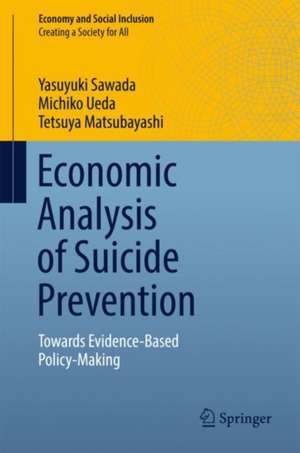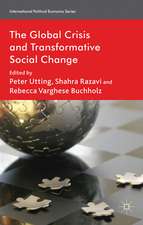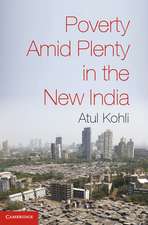Economic Analysis of Suicide Prevention: Towards Evidence-Based Policy-Making: Economy and Social Inclusion
Autor Yasuyuki Sawada, Michiko Ueda, Tetsuya Matsubayashien Limba Engleză Hardback – 3 noi 2017
| Toate formatele și edițiile | Preț | Express |
|---|---|---|
| Paperback (1) | 626.14 lei 38-44 zile | |
| Springer Nature Singapore – 4 sep 2018 | 626.14 lei 38-44 zile | |
| Hardback (1) | 783.50 lei 43-57 zile | |
| Springer Nature Singapore – 3 noi 2017 | 783.50 lei 43-57 zile |
Preț: 783.50 lei
Preț vechi: 955.49 lei
-18% Nou
Puncte Express: 1175
Preț estimativ în valută:
149.92€ • 156.95$ • 124.05£
149.92€ • 156.95$ • 124.05£
Carte tipărită la comandă
Livrare economică 07-21 aprilie
Preluare comenzi: 021 569.72.76
Specificații
ISBN-13: 9789811014994
ISBN-10: 981101499X
Pagini: 190
Ilustrații: XIV, 203 p. 31 illus., 17 illus. in color.
Dimensiuni: 155 x 235 mm
Greutate: 0.49 kg
Ediția:1st ed. 2017
Editura: Springer Nature Singapore
Colecția Springer
Seria Economy and Social Inclusion
Locul publicării:Singapore, Singapore
ISBN-10: 981101499X
Pagini: 190
Ilustrații: XIV, 203 p. 31 illus., 17 illus. in color.
Dimensiuni: 155 x 235 mm
Greutate: 0.49 kg
Ediția:1st ed. 2017
Editura: Springer Nature Singapore
Colecția Springer
Seria Economy and Social Inclusion
Locul publicării:Singapore, Singapore
Cuprins
1 Introduction.- Part I Why policy interventions by the government are necessary.- 2 Rationale Behind Suicide Prevention Policies.- 3 Socioeconomic Causes of Suicide.- 4 Natural Disasters and Suicide.- 5 Suicide Among Adolescents and Young Individuals.- 6 Railway Suicide in Japan.- Part II Prevention policies for reducing suicides.- 7 Government partisanship and suicide.- 8 Economic and Welfare Policies and Suicide.- 9 The Consequences of Government Suicide Prevention Programs.
Notă biografică
Yasuyuki Sawada is chief economist of the Asian Development Bank and a professor of economics at the University of Tokyo. He has previously been a visiting fellow at the Bangladesh Institute of Development Studies (BIDS) and a visiting professor at Stanford University. In his research, Professor Sawada uses micro-level data from developed and developing countries to analyze risk-coping strategies of individuals, households, and firms, particularly in response to natural and man-made disasters. He received his M.A. in international development policy and Ph.D. in economics, both from Stanford University. He is also a recipient of the Jiro Enjoji Memorial Prize and the 56th Nikkei Prize for Excellent Books in Economic Science of the Japan Center for Economic Research and the Ishikawa Prize of the Japanese Economic Association. He is a co-editor of The Japanese Economic Review.
Michiko Ueda is associate professor in the Faculty of Political Science and Economics at Waseda University. Prior to joining Waseda University, she was an assistant professor at Syracuse University and the California Institute of Technology and a visiting researcher at the University of Tokyo, Waseda University, and the Economic and Social Research Institute in the Cabinet Office. Her research interests include suicidology and suicide prevention, public health, and political science, and she has published articles in the areas of public health, medicine, and political science. She has received the 56th Nikkei Prize for Excellent Books in Economic Science, the Best Paper Award by the Japanese Association of Electoral Studies, the Jewell-Loewenberg Award by the Legislative Studies section of the American Political Science Association and the Waseda Research Award. She received her Ph.D. in political science from the Massachusetts Institute of Technology in 2006.
Tetsuya Matsubayashi is an associate professor of Osaka School of International Public Policy (OSIPP) at Osaka University, Japan. After receiving a Ph.D. in political science in 2007 from Texas A&M University, he worked as an assistant professor at the University of North Texas until 2013. His areas of research include mass political behavior, political representation, racial and ethnic politics, and public health. His work has appeared in the American Journal of Political Science, American Political Science Review, British Journal of Political Science, Political Research Quarterly, International Journal of Epidemiology, Social Science & Medicine, and others. He is a recipient of the 56th Nikkei Prize for Excellent Books in Economic Science.
Textul de pe ultima copertă
This book examines the causes and consequences of suicide from the perspective of economics. The approach here differs from those in medical, psychiatric, epidemiological, and sociological studies of suicide and is thus novel in a way that highlights the importance of economic and institutional settings in the problem of suicide. The authors argue that suicide imposes a tremendous economic cost on contemporary society in a variety of ways, requiring the government to develop an effective prevention strategy. An empirical analysis using data from Japan and other developed countries shows that natural disasters and economic crises increase suicide rates, while liberal government policies favorable to the poor can decrease them. Further, the types of effective prevention strategies in the context of railway/subway suicides, celebrity suicides, public awareness campaigns, and education using data primarily from Japan are revealed. This book ultimately contributes to an understandingof suicides and the development of evidence-based policy proposals. The Japanese version of this book won the 56th Nikkei Prize for Economics Books (Nikkei Keizai Tosho Bunka Award) in 2013.
Yasuyuki Sawada is Chief Economist of the Asian Development Bank and Professor of Economics at The University of Tokyo. Michiko Ueda is Associate Professor in the Faculty of Political Science and Economics at Waseda University. Tetsuya Matsubayashi is Associate Professor of Osaka School of International Public Policy (OSIPP) at Osaka University.
Caracteristici
Examines the causes and consequences of suicide from the perspective of economics Highlights the importance of economic and institutional settings in the problem of suicide Identifies empirically the types of effective strategies for suicide prevention in the context of railway/subway suicides, celebrity suicides, public awareness campaigns, and education Includes supplementary material: sn.pub/extras






















